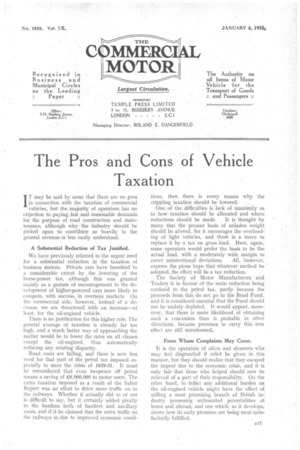The Pros and Cons of Vehicle Taxation
Page 27

If you've noticed an error in this article please click here to report it so we can fix it.
IT may be said by some that there are no pros in connection with the taxation of commercial vehicles, but the,majority of operators h,as no objection to paying. fair and reasonable demands for the purpose of road construction and maintenance, although why the industry should be picked upon to contribute so heavily to the general revenues is less easily understood.
A Substantial Reduction of Tax Justified.
We have previously referred to the urgent need for a substantial reduction in the taxation of business motors. Private cars have benefited to a considerable extent by the lowering of the • horse-power tax, although this was granted • mainly as a gesture of encouragement to the development of higher-powered cars more likely to compete, with success, in overseas markets. On • the commercial side, however, instead of a de-. crease, we are threatened with . an increase—at least, for the oil-engined vehicle.
There is no justification for this higher rate. The general average of taxation is already far too high, and a much better way of approaching the matter would be to lower the rates on all classes except the oil-engined, thus automatically reducing any existing disparity.
Road costs are falling, and there is now less need for that part of the petrol tax imposed es.pecially to meet the crisis of 1929-31. It must be remembered that even twopence off petrol means a saving of £9,000,000 to motor users. The extra taxation imposed as a result of the Salter Report was an effort to drive more traffic on to the railways. Whether it actually did so or not is difficalt to say, but it certainly added greatly to the burdens both of hauliers and ancillary users, and if it be claimed that the extra traffic on the railways is due to improved economic condi tions, then there is every reason why the crippling taxation should be lowered.
One of the _difficulties is lack of Unanimity as to. how taxation should be allocated and where reductions should be made. It is thought by many that the present basis of unladen weight should be altered, for it encourages the overloading of light vehicles, and there is a move to replace it by a tax on gross load. Here, again. some operators would prefer the basis to be the actual load, with a moderately wide margin to cover unintentional deviations. All, however, express the pious hope that whatever method be adopted, the effect will be a tax reduction.
' The Society of Motor • Manufacturers and Traders is in favour of the main reduction being confined to the petrol tax, partly because the proceeds from this do not go to the Road Fund, and it is considered essential that the Fund should not be unchily depleted. It would appear, • moreover, that there is more likelihood of obtaining such a concession than is probable in other directions, because promises to carry this into effect are still unredeemed.
• From Whom Complaints May Come.
It is the operators of oilers and steamers who may feel disgruntled if relief be given in this manner, but they should realize that they escaped the impost due to the economic crisis, and it is only fair that those who helped should now be relieved of a part of their responsibility. On the other hand, to inflict any additional burden on the oil-engined vehicle might have the effect of stifling a most promising branch of British in-, dustry possessing unbounded potentialities at home and abroad, and one which, as it develops, shows how its early promises are being most satisfactorily fulfilled.




















































































